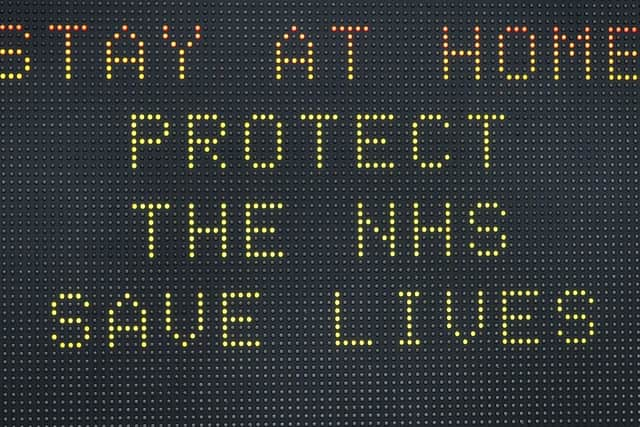'Your NHS needs you': Government calls for 250,000 volunteers to help the NHS fight coronavirus
and live on Freeview channel 276
Leading the daily briefing in Downing Street today, Matt Hancock called on healthy volunteers to come forward to fill the gaps in the health service which is facing its biggest challenge to treat those who have contracted coronavirus.
He “paid tribute” to 11,788 generous recently retired NHS staff who had returned to the health service, as he announced more than 35,000 extra staff would pour into the NHS, including 5,500 final-year medics and 18,700 final-year student nurses who would "move to the frontline" next week.
Advertisement
Hide AdAdvertisement
Hide AdThe volunteers would be asked to help the 1.5m the Government has identified as being particularly vulnerable to coronavirus, and who they have therefore told they must stay at home for 12 weeks.


Those who sign up would help with delivering medicines from pharmacies, driving patients to and from appointments, or making regular phone calls to check on people isolating at home.
Once registered using the GoodSAM app volunteers can be called on by GPs, doctors, pharmacists, nurses, midwives, NHS 111 advisers and social care staff via a call centre run by the Royal Voluntary Service (RVS), who will match people who need help with volunteers who live near to them.
Dr Nikki Kanani, GP and NHS Director of Primary Care, said: “Coronavirus is the biggest challenge we have ever faced, which is why we’re rallying the troops and telling the public: your NHS needs you.”
Advertisement
Hide AdAdvertisement
Hide AdShe added: ““This is one of those once-in-a-lifetime moments where a single action from one person can be the difference between life and death for another, and simple acts of kindness are going to make all the difference in keeping some of the most vulnerable people well and out of hospital.”
However the acute pressure on hospitals was laid bare as Mr Hancock unveiled a 4,000-bed temporary hospital, the Nightingale Hospital, would be opened in the ExCel Centre in London with the help of the military.
Mr Hancock said the hospital would open next week and added: "The NHS Nightingale Hospital will comprise two wards, each of 2,000 people.
"With the help of the military and with NHS clinicians we will make sure that we have the capacity that we need so that everyone can get the support that they need."
Advertisement
Hide AdAdvertisement
Hide AdBut it came as the Health Service Journal reported London’s critical care units were just four days from running out of beds unless action was taken.
They reported NHS bosses had warned the need for intensive care beds was set to double every three days.
It comes amid the largest jump yet in deaths from the disease in the UK, with 87 deaths added to the toll overnight, bringing the total to 422.
Some four of those new deaths were in Leeds, meaning 10 people have now died after testing positive for Covid-19 in Yorkshire.
Advertisement
Hide AdAdvertisement
Hide AdAs of 9am today there had been 90,436 tests carried out countrywide, with 8,077 testing positive.
In Yorkshire 272 people have tested positive.
The UK's first coronavirus-related death was recorded on March 5. It took another 13 days for the number of deaths to pass 100 on March 18, then three more days to pass 200 on March 21. It has taken a further three days for the total to pass 400.
The Government has also come under pressure to provide better protective equipment for staff, after it was feared they were at risk.
NHS England's national medical director Professor Stephen Powis said: “The NHS is pulling out all the stops at present, amazing staff doing amazing things."
Advertisement
Hide AdAdvertisement
Hide AdThe Nightingale hospital was an "extraordinary feat", he said.
"From a standing start a day or two ago a hospital will be built that will be able to take its first patients at the start of next week," he added.
While Mr Hancock said 7.5m pieces of protective equipment including facemasks had been shipped out in the last 24 hours.
A hotline would allow NHS and care staff to request personal protective equipment if they did not have it.
Advertisement
Hide AdAdvertisement
Hide AdThe armed forces have been involved in the logistics and Mr Hancock said it had been "literally a military effort to get these millions of pieces of kit out to people".
"If people are working on the front line to look after us, it's vital that we look after them."
Mr Hancock also said a new testing facility in Milton Keynes had opened today so NHS staff would soon be able to be tested for the coronavirus.
He said the UK had bought 3.5m antibody tests to show whether people have had the virus.
Advertisement
Hide AdAdvertisement
Hide Ad"I understand why NHS staff, in particular, and others across public service are so keen to get the testing ramped up, that we need to see and that we are undertaking," he said.
"Of course it really matters for getting people back to work, so we have now bought 3.5 million antibody tests.
"That will allow people to see whether they have had the virus and are immune to it and then can get back to work."
Prof Powis said:"It's absolutely right that our sick patients in hospitals should be tested first, but after that we absolutely need to be able to test our staff."
This would allow people who tested negative to return to work from quarantine and would also identify those who had contracted the disease and had immunity.